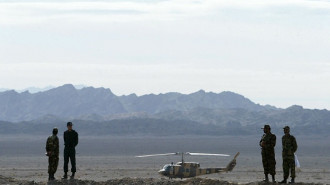Over half of Lebanese willing to vote in May parliament elections: Oxfam report
Welcome to The New Arab’s coverage of Lebanon’s General Election 2022 held on May 15, 2022. Follow live updates, results, analyses, and opinion in our special hub here.
An Oxfam study on Lebanon's upcoming parliamentary elections found that 54 percent of respondents said they are willing to take part in the May 15 election.
The study, published on Tuesday, highlights the voting behaviours of constituents across three different regions in the country and the reasons behind them after the popular 2019 uprising.
The research paper focuses on the capital Beirut, which is divided into two constituencies, as well as the Mount Lebanon Chouf-Aley constituency, and the southern Tyre-Zahrani constituency.
"We aimed to do a comparative analysis in these four diverse constituencies, such as urban and rural for example," Dana Abed, the head of Policy and Influencing at Oxfam Lebanon, told The New Arab.
"Each region has special characteristics. In Beirut for example there was the [August 2020] port blast, and the October 17 [2019] uprising was focused there," she added.
Abed said that the study took into consideration the sectarian and religious differences between the various districts, among a number of other factors, analysing voter turnout by sect.
Under Lebanon’s confessional based power sharing system, parliament is divided equally between Christians and Muslims, with the Druze included as Muslims. There are 18 officially recognised religious sects in Lebanon.
More than 4,600 people were surveyed and 15 in-depth interviews were conducted, according to the report, which looked at the reasons for voter turnout and why voters would not participate, who to vote for, as well as the participation of both women and members of the LGBT+ community.
When asked about whether people clarified who they wanted to vote for specifically, Abed said the survey didn’t go into that much detail but rather focused more on whether those interviewed wanted to vote for ruling elite parties associated with the sect-based power-sharing system or non-confessional reformist movements.
"We wanted to see if people have an appetite for political change and we were non-biased in our approach," Abed said.
"Turnout is affected by the feeling of hopelessness and disappointment that reigns in the country," the report said, as the country has lived an unprecedented and worsening financial and economic crisis since late 2019.
The economic meltdown has affected every sector in the country, where power cuts can last for whole days in some regions and the government is incapable of offering basic public services.
But more than 48 percent of those who said they will vote will cast their ballots in favour of independents, said the report.
.@DarioSabaghi examines what to expect from the diaspora vote ahead of Lebanon's elections in May 2022 👇 https://t.co/oeqAPaXnhy
— The New Arab (@The_NewArab) January 30, 2022
The elections are considered by many people to be the first springboard towards change following the large nationwide protests which began in 2019.
Many non-confessional reformist parties which were founded either before or after are running in this year’s polls, challenging the status quo.
"Interestingly, not all those who will vote for change participated in the protests. This opens up a discussion about political expression and protest methods, as it seems that taking to the streets is not the preferred strategy of all those who oppose the ruling elites," the report said.
"Independent candidates are using door-to-door, grassroots campaigning methods, trying to advance a message that is anti-confessionalism and anti-clientelism. Those methods should continue postelection, specifically to create local spaces for civic engagement."
In regard to correspondents who said they want to vote for old-guard ruling parties, the main reasons given were grounded in tradition, according to the report.
This shows that "political literacy still needs cultivating in the country," the report said.
While it does not specify what the reasons are and just states "historic reasons and out of habit," many in divided Lebanon have traditionally chosen candidates based on family, sectarian or regional ties.
'The status of women in our country is miserable': Lebanese women fight to be heard in the upcoming elections https://t.co/NOunnI4hBF
— The New Arab (@The_NewArab) April 12, 2022
Oxfam’s report touched on the lack of female representation in the electoral process. While in some lists women make up at least half or more of the candidates, in others they are a minority or simply absent.
It added that members of the LGBT+ community also "continue to be absent" from the political scene.
The political scene is still largely dominated by men, as Lebanon’s parliament has one of the lowest number of female lawmakers in the region.
While liberal Beirut is largely considered to be gay-friendly in comparison to surrounding countries, the topic remains largely taboo in Lebanon’s religiously diverse society.

![Palestinians mourned the victims of an Israeli strike on Deir al-Balah [Getty]](/sites/default/files/styles/image_684x385/public/2024-11/GettyImages-2182362043.jpg?h=199d8c1f&itok=xSHZFbmc)


![The law could be enforced against teachers without prior notice [Getty]](/sites/default/files/styles/image_684x385/public/2178740715.jpeg?h=a5f2f23a&itok=hnqrCS4x)
 Follow the Middle East's top stories in English at The New Arab on Google News
Follow the Middle East's top stories in English at The New Arab on Google News
![Fakhrizadeh [AFP] Fakhrizadeh [AFP]](/sites/default/files/styles/image_330x185/public/media/images/774C39F7-8F7A-4D67-B998-27D102FCB4A7.png?h=d1cb525d&itok=j9eGvunV)

